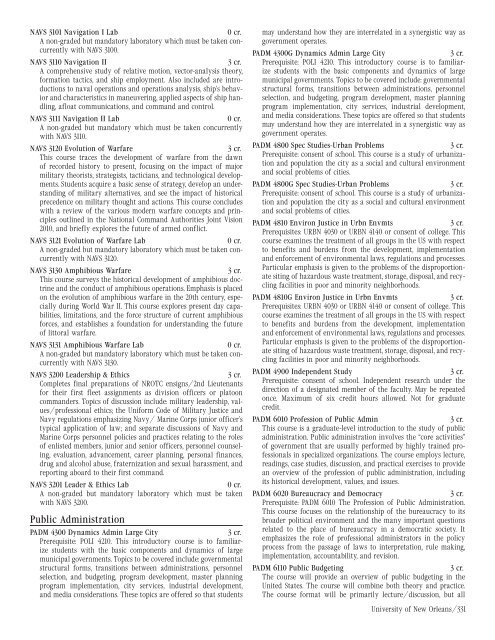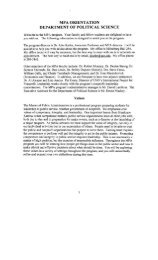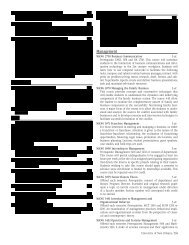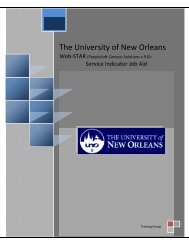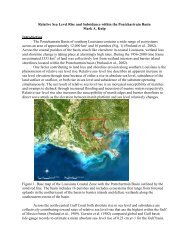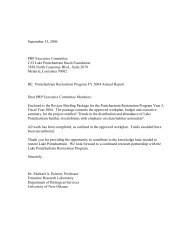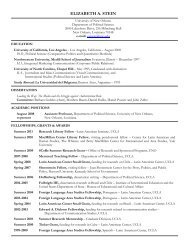Untitled - University of New Orleans
Untitled - University of New Orleans
Untitled - University of New Orleans
Create successful ePaper yourself
Turn your PDF publications into a flip-book with our unique Google optimized e-Paper software.
NAVS 3101 Navigation I Lab<br />
0 cr.<br />
A non-graded but mandatory laboratory which must be taken concurrently<br />
with NAVS 3100.<br />
NAVS 3110 Navigation II<br />
3 cr.<br />
A comprehensive study <strong>of</strong> relative motion, vector-analysis theory,<br />
formation tactics, and ship employment. Also included are introductions<br />
to naval operations and operations analysis, ship’s behavior<br />
and characteristics in maneuvering, applied aspects <strong>of</strong> ship handling,<br />
afloat communications, and command and control.<br />
NAVS 3111 Navigation II Lab<br />
0 cr.<br />
A non-graded but mandatory which must be taken concurrently<br />
with NAVS 3110.<br />
NAVS 3120 Evolution <strong>of</strong> Warfare<br />
3 cr.<br />
This course traces the development <strong>of</strong> warfare from the dawn<br />
<strong>of</strong> recorded history to present, focusing on the impact <strong>of</strong> major<br />
military theorists, strategists, tacticians, and technological developments.<br />
Students acquire a basic sense <strong>of</strong> strategy, develop an understanding<br />
<strong>of</strong> military alternatives, and see the impact <strong>of</strong> historical<br />
precedence on military thought and actions. This course concludes<br />
with a review <strong>of</strong> the various modern warfare concepts and principles<br />
outlined in the National Command Authorities Joint Vision<br />
2010, and briefly explores the future <strong>of</strong> armed conflict.<br />
NAVS 3121 Evolution <strong>of</strong> Warfare Lab<br />
0 cr.<br />
A non-graded but mandatory laboratory which must be taken concurrently<br />
with NAVS 3120.<br />
NAVS 3130 Amphibious Warfare<br />
3 cr.<br />
This course surveys the historical development <strong>of</strong> amphibious doctrine<br />
and the conduct <strong>of</strong> amphibious operations. Emphasis is placed<br />
on the evolution <strong>of</strong> amphibious warfare in the 20th century, especially<br />
during World War II. This course explores present day capabilities,<br />
limitations, and the force structure <strong>of</strong> current amphibious<br />
forces, and establishes a foundation for understanding the future<br />
<strong>of</strong> littoral warfare.<br />
NAVS 3131 Amphibious Warfare Lab<br />
0 cr.<br />
A non-graded but mandatory laboratory which must be taken concurrently<br />
with NAVS 3130.<br />
NAVS 3200 Leadership & Ethics<br />
3 cr.<br />
Completes final preparations <strong>of</strong> NROTC ensigns/2nd Lieutenants<br />
for their first fleet assignments as division <strong>of</strong>ficers or platoon<br />
commanders. Topics <strong>of</strong> discussion include: military leadership, values/pr<strong>of</strong>essional<br />
ethics; the Uniform Code <strong>of</strong> Military Justice and<br />
Navy regulations emphasizing Navy/ Marine Corps junior <strong>of</strong>ficer’s<br />
typical application <strong>of</strong> law; and separate discussions <strong>of</strong> Navy and<br />
Marine Corps personnel policies and practices relating to the roles<br />
<strong>of</strong> enlisted members, junior and senior <strong>of</strong>ficers, personnel counseling,<br />
evaluation, advancement, career planning, personal finances,<br />
drug and alcohol abuse, fraternization and sexual harassment, and<br />
reporting aboard to their first command.<br />
NAVS 3201 Leader & Ethics Lab<br />
0 cr.<br />
A non-graded but mandatory laboratory which must be taken<br />
with NAVS 3200.<br />
Public Administration<br />
PADM 4300 Dynamics Admin Large City<br />
3 cr.<br />
Prerequisite: POLI 4210. This introductory course is to familiarize<br />
students with the basic components and dynamics <strong>of</strong> large<br />
municipal governments. Topics to be covered include: governmental<br />
structural forms, transitions between administrations, personnel<br />
selection, and budgeting, program development, master planning<br />
program implementation, city services, industrial development,<br />
and media considerations. These topics are <strong>of</strong>fered so that students<br />
may understand how they are interrelated in a synergistic way as<br />
government operates.<br />
PADM 4300G Dynamics Admin Large City<br />
3 cr.<br />
Prerequisite: POLI 4210. This introductory course is to familiarize<br />
students with the basic components and dynamics <strong>of</strong> large<br />
municipal governments. Topics to be covered include: governmental<br />
structural forms, transitions between administrations, personnel<br />
selection, and budgeting, program development, master planning<br />
program implementation, city services, industrial development,<br />
and media considerations. These topics are <strong>of</strong>fered so that students<br />
may understand how they are interrelated in a synergistic way as<br />
government operates.<br />
PADM 4800 Spec Studies-Urban Problems<br />
3 cr.<br />
Prerequisite: consent <strong>of</strong> school. This course is a study <strong>of</strong> urbanization<br />
and population the city as a social and cultural environment<br />
and social problems <strong>of</strong> cities.<br />
PADM 4800G Spec Studies-Urban Problems<br />
3 cr.<br />
Prerequisite: consent <strong>of</strong> school. This course is a study <strong>of</strong> urbanization<br />
and population the city as a social and cultural environment<br />
and social problems <strong>of</strong> cities.<br />
PADM 4810 Environ Justice in Urbn Envmts<br />
3 cr.<br />
Prerequisites: URBN 4030 or URBN 4140 or consent <strong>of</strong> college. This<br />
course examines the treatment <strong>of</strong> all groups in the US with respect<br />
to benefits and burdens from the development, implementation<br />
and enforcement <strong>of</strong> environmental laws, regulations and processes.<br />
Particular emphasis is given to the problems <strong>of</strong> the disproportionate<br />
siting <strong>of</strong> hazardous waste treatment, storage, disposal, and recycling<br />
facilities in poor and minority neighborhoods.<br />
PADM 4810G Environ Justice in Urbn Envmts<br />
3 cr.<br />
Prerequisites: URBN 4030 or URBN 4140 or consent <strong>of</strong> college. This<br />
course examines the treatment <strong>of</strong> all groups in the US with respect<br />
to benefits and burdens from the development, implementation<br />
and enforcement <strong>of</strong> environmental laws, regulations and processes.<br />
Particular emphasis is given to the problems <strong>of</strong> the disproportionate<br />
siting <strong>of</strong> hazardous waste treatment, storage, disposal, and recycling<br />
facilities in poor and minority neighborhoods.<br />
PADM 4900 Independent Study<br />
3 cr.<br />
Prerequisite: consent <strong>of</strong> school. Independent research under the<br />
direction <strong>of</strong> a designated member <strong>of</strong> the faculty. May be repeated<br />
once. Maximum <strong>of</strong> six credit hours allowed. Not for graduate<br />
credit.<br />
PADM 6010 Pr<strong>of</strong>ession <strong>of</strong> Public Admin<br />
3 cr.<br />
This course is a graduate-level introduction to the study <strong>of</strong> public<br />
administration. Public administration involves the “core activities”<br />
<strong>of</strong> government that are usually performed by highly trained pr<strong>of</strong>essionals<br />
in specialized organizations. The course employs lecture,<br />
readings, case studies, discussion, and practical exercises to provide<br />
an overview <strong>of</strong> the pr<strong>of</strong>ession <strong>of</strong> public administration, including<br />
its historical development, values, and issues.<br />
PADM 6020 Bureaucracy and Democracy<br />
3 cr.<br />
Prerequisite: PADM 6010 The Pr<strong>of</strong>ession <strong>of</strong> Public Administration.<br />
This course focuses on the relationship <strong>of</strong> the bureaucracy to its<br />
broader political environment and the many important questions<br />
related to the place <strong>of</strong> bureaucracy in a democratic society. It<br />
emphasizes the role <strong>of</strong> pr<strong>of</strong>essional administrators in the policy<br />
process from the passage <strong>of</strong> laws to interpretation, rule making,<br />
implementation, accountability, and revision.<br />
PADM 6110 Public Budgeting<br />
3 cr.<br />
The course will provide an overview <strong>of</strong> public budgeting in the<br />
United States. The course will combine both theory and practice.<br />
The course format will be primarily lecture/discussion, but all<br />
<strong>University</strong> <strong>of</strong> <strong>New</strong> <strong>Orleans</strong>/331


